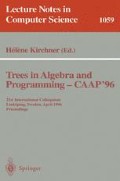Abstract
We use the well-known framework of concrete categories to show how much of standard universal algebra may be done in an abstract and still rather intuitive way. This is used to recast the unifying view of behavioural semantics of specifications based on behavioural satisfaction and, respectively, on behavioural equivalence of models abstracting away from many particular features of standard algebras. We also give an explicit representation of behavioural equivalence between models in terms of behavioural correspondences.
A full version of this paper is available as [BT95b].
Preview
Unable to display preview. Download preview PDF.
References
Bidoit, M., Hennicker, R. Behavioural theories and the proof of behavioural properties. Theoretical Computer Science, to appear; short version: Proving behavioural theorems with standard first-order logic. Proc. Intl. Conf. Algebraic and Logic Programmming ALP'94, Springer LNCS 850, 41–58, 1994.
Bidoit, M., Hennicker, R. Modular correctness proofs of behavioural implementations. Technical report, 1995; short version: Proving the correctness of behavioural implementations. Proc. Intl. Conf. Algebraic Methodology and Software Technology AMAST'95, Springer LNCS 936, 152–168, 1995.
Bidoit, M., Hennicker, R., Wirsing, M. Behavioural and abstractor specifications. Science of Computer Programming No 2–3:25(1995); short version: Characterizing behavioural semantics and abstractor semantics. Proc. European Symp. on Programming ESOP'94, Springer LNCS 788, 105–119, 1994.
Bidoit, M., Tarlecki, A. Regular algebras: a framework for observational specifications with recursive definitions. Report LIENS-95-12, Ecole Normale Supérieure, Paris 1995.
Bidoit, M., Tarlecki, A. Behavioural satisfaction and equivalence in concrete model categories. Full version. Technical report, Warsaw University and Ecole Normale Supérieure, September 1995. Available by WWW: http://zls.mimuw.edu.pl//R~tarlecki/drafts/behabs.ps,dvi.
Bidoit, M., Tarlecki, A. Behavioural satisfaction and equivalence in concrete institutions. Technical report, Warsaw University and Ecole Normale Supérieure, in preparation.
Burstall, R., Diaconescu, R. Hiding and behaviour: an institutional approach. A Classical Mind: Esseys in Honour of C.A.R. Hoare, A.W. Roscoe, ed., 75–92, Prentice-Hall 1994.
Giarratana, V., Gimona, F., Montanari, U. Observability concepts in abstract data type specification. Proc. 5th Intl. Symp. Mathematical Foundations of Computer Science MFCS'76, Springer LNCS 45, 576–587, 1976.
Goguen, J.A., Burstall, R.M. Institutions: abstract model theory for computer science. J. of the ACM 39(1992), 95–146; earlier version: Introducing institutions. Proc. Logics of Programming Workshop, Springer LNCS 164, 221–256, 1984.
Hoare, C.A.R. Proofs of correctness of data representations. Acta Informatica 1(1972), 271–281.
Hofmann, M., Sannella, D. On behavioural abstraction and behavioural satisfaction in higher-order logic. Proc. 6th Intl. Conf. CAAP/FASE Theory and Practice of Software Development TAPSOFT'95, Springer LNCS 915, 247–261, 1995.
MacLane, S. Categories for the Working Mathematician. Springer 1971.
Milner, R. Fully abstract models of typed lambda-calculi. Theoretical Computer Sci. 4(1977), 1–22.
Nivela, P., Orejas, F. Initial behaviour semantics for algebraic specifications. Recent Trends in Data Type Specification, Selected Papers from the 5th Work. Specification of Abstract Data Types ADT'87, Springer LNCS 332, 184–207, 1988.
Plotkin, G.D. LCF considered as a programming language. Theoretical Computer Sci. 5(1977), 223–255.
Reichel, H. Behavioural validity of conditional equations in abstract data types. Proc. Vienna Conference on Contributions to General Algebra, 301–324, Treubner-Verlag 1985.
Sannella, D., Tarlecki, A. On observational equivalence and algebraic specification. J. Computer and System Sci. 34(1987), 150–178.
Sannella, D., Tarlecki, A. Model-theoretic foundations for formal program development: basic concepts and motivation. Report ICS PAS 792, Inst. Comp. Sci. PAS, Warsaw 1995; short version: Toward formal development of programs from algebraic specifications: model-theoretic foundations. Proc. Intl. Coll. on Automata, Languages and Programming ICALP'92, Springer LNCS 623, 656–671, 1992.
Schoett, O. Data abstraction and correctness of modular programming. PhD thesis, CST-42-87, Dept. of Computer Science, Univ. of Edinburgh, 1987.
Tarlecki, A. Quasi-varieties in abstract algebraic institutions. J. Computer and System Sciences 33(1986), 333–360.
Author information
Authors and Affiliations
Editor information
Rights and permissions
Copyright information
© 1996 Springer-Verlag Berlin Heidelberg
About this paper
Cite this paper
Bidoit, M., Tarlecki, A. (1996). Behavioural satisfaction and equivalence in concrete model categories. In: Kirchner, H. (eds) Trees in Algebra and Programming — CAAP '96. CAAP 1996. Lecture Notes in Computer Science, vol 1059. Springer, Berlin, Heidelberg. https://doi.org/10.1007/3-540-61064-2_41
Download citation
DOI: https://doi.org/10.1007/3-540-61064-2_41
Published:
Publisher Name: Springer, Berlin, Heidelberg
Print ISBN: 978-3-540-61064-9
Online ISBN: 978-3-540-49944-2
eBook Packages: Springer Book Archive

